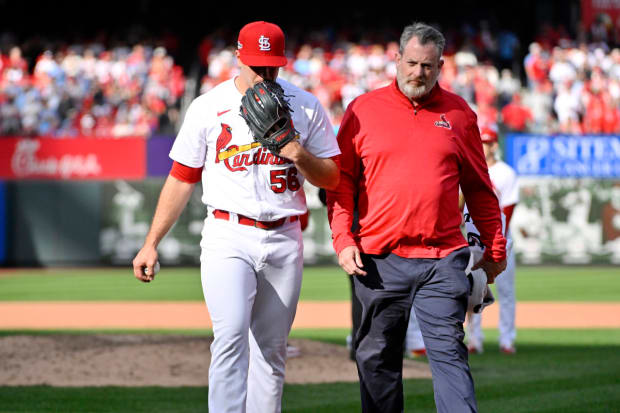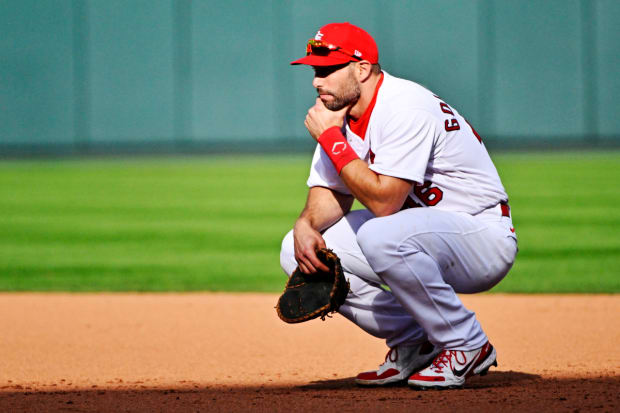ST. LOUIS — There have been a few core pieces the Cardinals have been able to count on all season. One is Ryan Helsley—among the sharpest relievers in the game, to say nothing of the hardest-throwing, who finally unlocked his potential this year with career-low walks and career-high strikeouts. Another is the infield defense—an efficient, cohesive unit, responsible for the fewest team errors in baseball. The roster certainly has other assets. But these? They’ve been the most reliable—less like mere strengths, more like obvious truths, seemingly unalienable and irrevocable.
Yet St. Louis’s ninth inning on Friday was a reminder that any baseball truth is only as reliable as the last time it was told. The Cardinals stood two outs away from what could have been a 2–0 victory over the Phillies. Then, in a dizzying meltdown, St. Louis gave up six runs in the space of less than half an hour, watching that lead disappear into a miserable deficit. Helsley lost his command, the infield lost its polish and the Cardinals lost it all, 6–3.
There is little margin for error in these best-of-three wild-card series. Which means this one nightmarish inning in Game 1 put the season on the brink for St. Louis.
“You just chalk it up to baseball,” Cardinals manager Oli Marmol said. “And you keep moving.”

Jeff Curry/USA TODAY Sports
Fair enough. But this brand of baseball was disjointed and sloppy in a way his team had not been all year—uncharacteristic for this roster, and especially for this franchise, to the point of freakishness.
Helsley entered the game with one away in the eighth inning. Tasked with protecting a two-run lead—the sort of task he’d handled smoothly all year—the righty got to work. While he’d needed to depart his last outing in the regular season with a jammed finger on his throwing hand, St. Louis had said Helsley would be fine for the playoffs, and he initially looked the part. He easily recorded the last two outs of the eighth and got a quick strikeout to start the ninth. But then he allowed a single. Next a walk. Then a more horrific walk, this one on five pitches, two of them in the dirt. He suddenly appeared to have no feel for the zone: This was a reliever with a 1.25 ERA, one who’d allowed only nine earned runs all season, with six of them from home runs. This kind of traffic on the basepaths for him was rare. This kind of unraveling was near-unfathomable.
That meant the bases were loaded for Phillies third baseman Alec Bohm. And the Cardinals decided to leave Helsley in to face him. “You’re hoping he gets it back,” Marmol said of his mindset after the reliever’s two walks. “He’s been super reliable all year. Obviously we're aware of the issue with the finger, it wasn't an issue early on, didn't show any signs of it. Once you go back-to-back walks, you're thinking this is the last hitter.” Which it was. Just not like Marmol had been hoping.
Helsley’s first pitch to Bohm was in the dirt. His second was fouled off. But his third was his worst miss yet: A 100-mph fastball, up and in, that hit the batter to bring in a run. The 2–0 lead was now 2–1—with the bases loaded and still just one out in the ninth.
The bullpen got busy while a trainer came out to look at Helsley. (He was removed and sent for imaging on his finger after the game.) The Cardinals had two choices warming up to replace him: Jack Flaherty, the starter recently converted to a relief weapon, or Andre Pallante, the rookie ground-ball specialist. But the men on base made it an ideal situation for the latter. With this vaunted infield defense, after all, a double play should have been no problem.
And so Pallante did more or less what had been asked of him. Facing the Phillies’ speedy Jean Segura, he threw a low slider that could have been a grounder to second baseman Tommy Edman, who ranks among the best fielders on this squad.
“I saw it on the ground,” Pallante said, “and it was exactly what I wanted.”
It was the sort of play that Edman makes regularly—not easy, certainly, but something that might seem routine in the hands of a defender this capable. But this one? It passed him by.
“It just got through,” Pallante said.
Two runs scored. The Cardinals’ lead was gone in the most unexpected way possible. A collapse by their most consistent reliever had been surprising. But this subsequent defensive misplay seemed downright inconceivable.
Asked if Segura’s hit might have been saved if the infield had been positioned any differently—further back, perhaps—Marmol insisted they were in the right place. His fielders did, too: This was how they said they would have set up for this situation at any point this season.
“We were in the middle,” Cardinals first baseman Paul Goldschmidt said. “I mean, you don’t want to be all the way in right there and give up the lead on a ball that you maybe could have got to. So we were in the middle, which is a spot that we play all the time, a lot right there. And he just was able to get it by Tommy.”

Jeff Curry/USA TODAY Sports
Yet it got worse. And worse. Three more runs would score in an inning full of bad looks and shoddy defense—including, most stunningly, one on a missed play from nine-time Gold Glove third baseman Nolan Arenado.
“That’s just kind of how the inning went,” Arenado said. “It just wasn’t going our way. It just got through. What are you going to do?”
An attempted rally in the bottom of the ninth wasn’t enough to save them.
A day that had begun as a pitchers’ duel between the Phillies’ Zack Wheeler and the Cardinals’ José Quintana ended as something far weirder and messier. Each of the starters had looked terrific. In the seventh inning, after both had been removed, St. Louis got on the board with a pinch-hit home run from Juan Yepez. It was the first pitch the rookie had ever seen in the playoffs, and he drove it straight into the stands, creating a 2–0 lead for the Cardinals. It seemed like it would hold—right until it didn’t.
“We played a good game, just until the end,” Arenado said. “Hopefully we can play a complete game tomorrow.”







